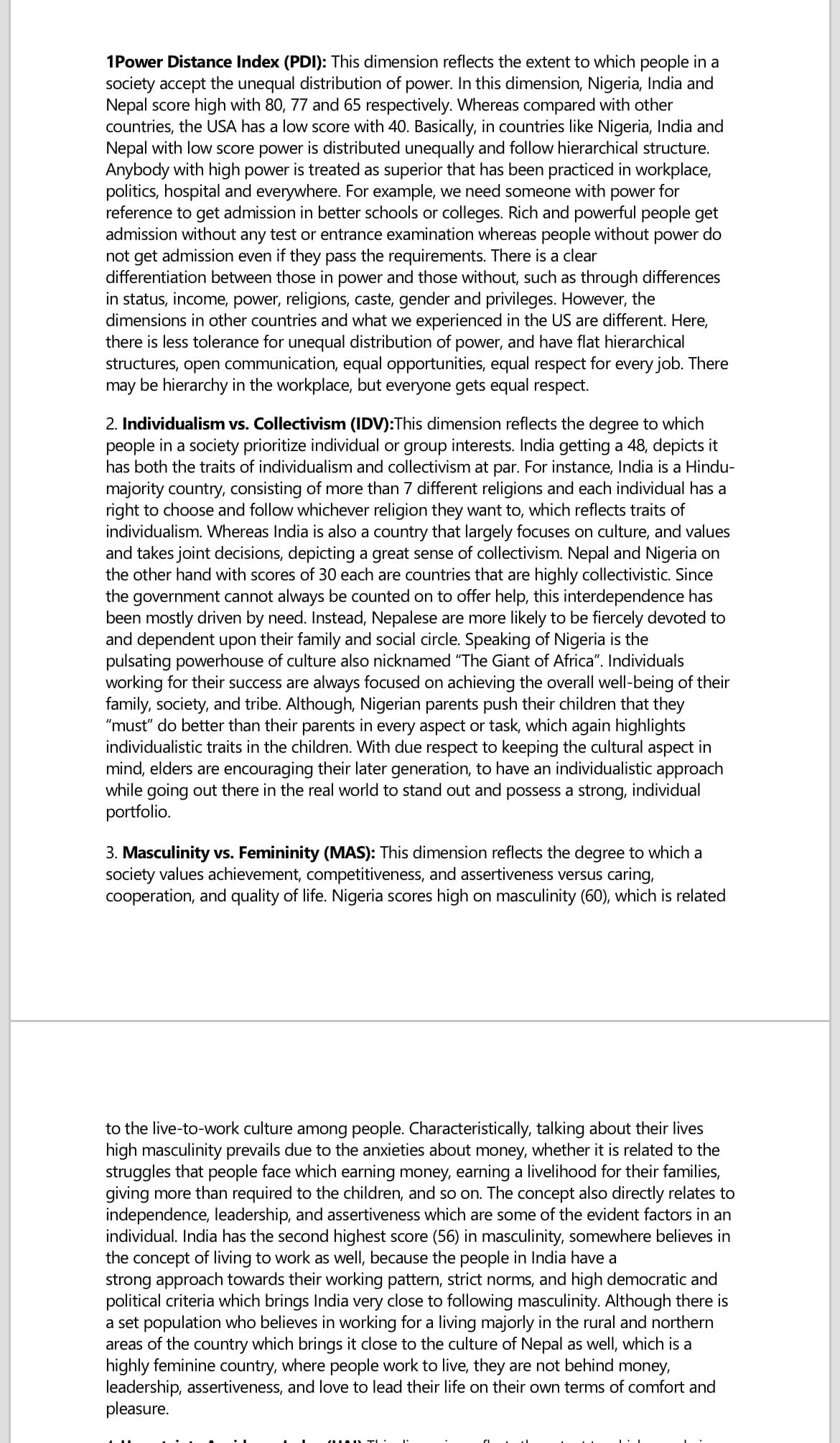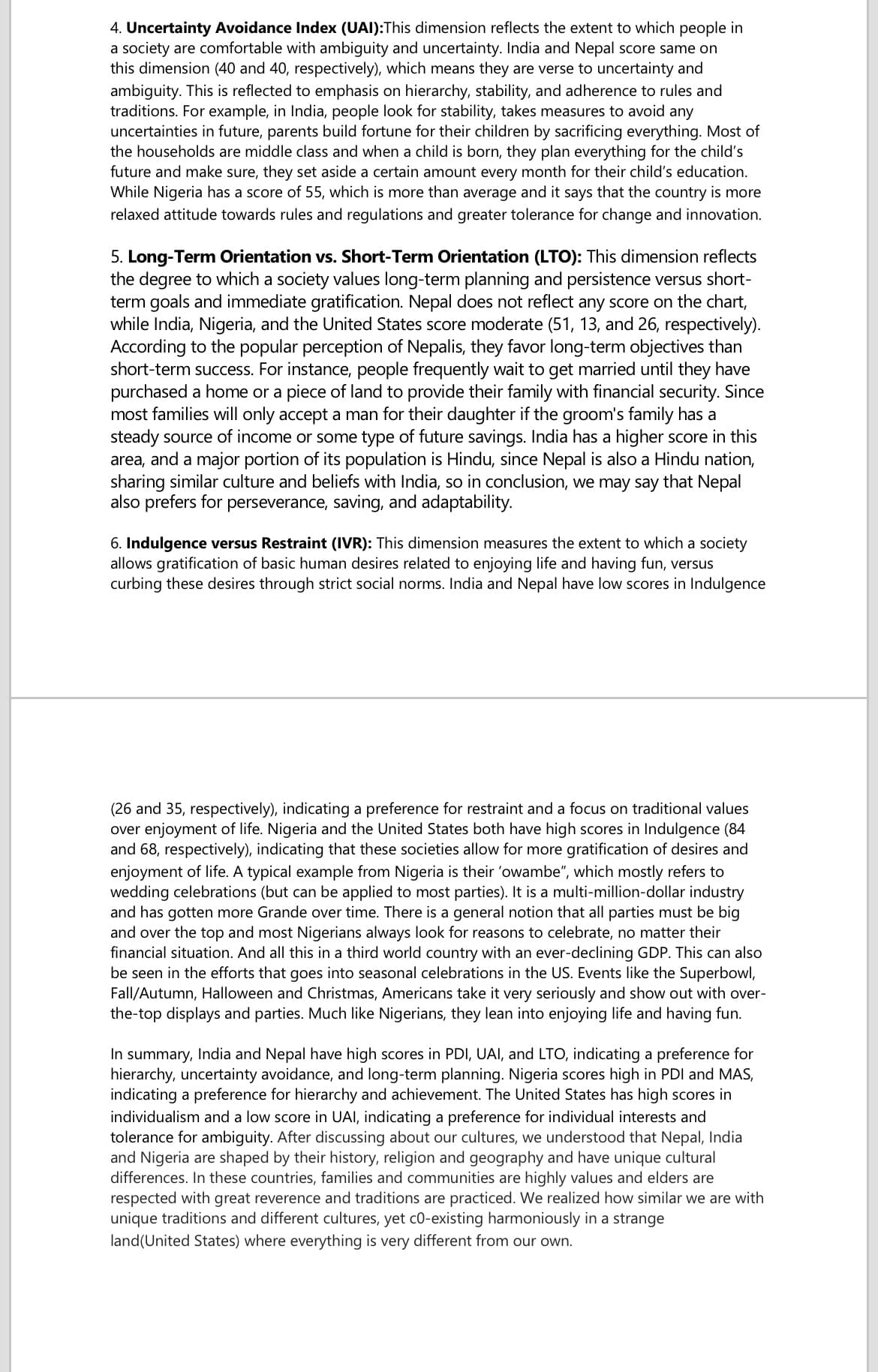Yes, you've worked together as a team for several weeks and you've discussed your "cross cultural dimensions" and how they differ (Hofstede). ( How did it develop and work together), AND did you notice cross cultural differences during your work ( that is, were you cross culturally sensitive?
Yes, you've worked together as a team for several weeks and you've discussed your "cross cultural dimensions" and how they differ (Hofstede). ( How did it develop and work together), AND did you notice cross cultural differences during your work ( that is, were you cross culturally sensitive?
Chapter1: Taking Risks And Making Profits Within The Dynamic Business Environment
Section: Chapter Questions
Problem 1CE
Related questions
Question
100%
Yes, you've worked together as a team for several weeks and you've discussed your "cross cultural dimensions" and how they
differ (Hofstede).
( How did it develop and work
together),
AND did you notice cross cultural differences during your work ( that is, were you cross culturally sensitive?

Transcribed Image Text:1Power Distance Index (PDI): This dimension reflects the extent to which people in a
society accept the unequal distribution of power. In this dimension, Nigeria, India and
Nepal score high with 80, 77 and 65 respectively. Whereas compared with other
countries, the USA has a low score with 40. Basically, in countries like Nigeria, India and
Nepal with low score power is distributed unequally and follow hierarchical structure.
Anybody with high power is treated as superior that has been practiced in workplace,
politics, hospital and everywhere. For example, we need someone with power for
reference to get admission in better schools or colleges. Rich and powerful people get
admission without any test or entrance examination whereas people without power do
not get admission even if they pass the requirements. There is a clear
differentiation between those in power and those without, such as through differences
in status, income, power, religions, caste, gender and privileges. However, the
dimensions in other countries and what we experienced in the US are different. Here,
there is less tolerance for unequal distribution of power, and have flat hierarchical
structures, open communication, equal opportunities, equal respect for every job. There
may be hierarchy in the workplace, but everyone gets equal respect.
2. Individualism vs. Collectivism (IDV):This dimension reflects the degree to which
people in a society prioritize individual or group interests. India getting a 48, depicts it
has both the traits of individualism and collectivism at par. For instance, India is a Hindu-
majority country, consisting of more than 7 different religions and each individual has a
right to choose and follow whichever religion they want to, which reflects traits of
individualism. Whereas India is also a country that largely focuses on culture, and values
and takes joint decisions, depicting a great sense of collectivism. Nepal and Nigeria on
the other hand with scores of 30 each are countries that are highly collectivistic. Since
the government cannot always be counted on to offer help, this interdependence has
been mostly driven by need. Instead, Nepalese are more likely to be fiercely devoted to
and dependent upon their family and social circle. Speaking of Nigeria is the
pulsating powerhouse of culture also nicknamed "The Giant of Africa". Individuals
working for their success are always focused on achieving the overall well-being of their
family, society, and tribe. Although, Nigerian parents push their children that they
"must" do better than their parents in every aspect or task, which again highlights
individualistic traits in the children. With due respect to keeping the cultural aspect in
mind, elders are encouraging their later generation, to have an individualistic approach
while going out there in the real world to stand out and possess a strong, individual
portfolio.
3. Masculinity vs. Femininity (MAS): This dimension reflects the degree to which a
society values achievement, competitiveness, and assertiveness versus caring,
cooperation, and quality of life. Nigeria scores high on masculinity (60), which is related
to the live-to-work culture among people. Characteristically, talking about their lives
high masculinity prevails due to the anxieties about money, whether it is related to the
struggles that people face which earning money, earning a livelihood for their families,
giving more than required to the children, and so on. The concept also directly relates to
independence, leadership, and assertiveness which are some of the evident factors in an
individual. India has the second highest score (56) in masculinity, somewhere believes in
the concept of living to work as well, because the people in India have a
strong approach towards their working pattern, strict norms, and high democratic and
political criteria which brings India very close to following masculinity. Although there is
a set population who believes in working for a living majorly in the rural and northern
areas of the country which brings it close to the culture of Nepal as well, which is a
highly feminine country, where people work to live, they are not behind money,
leadership, assertiveness, and love to lead their life on their own terms of comfort and
pleasure.

Transcribed Image Text:4. Uncertainty Avoidance Index (UAI):This dimension reflects the extent to which people in
a society are comfortable with ambiguity and uncertainty. India and Nepal score same on
this dimension (40 and 40, respectively), which means they are verse to uncertainty and
ambiguity. This is reflected to emphasis on hierarchy, stability, and adherence to rules and
traditions. For example, in India, people look for stability, takes measures to avoid any
uncertainties in future, parents build fortune for their children by sacrificing everything. Most of
the households are middle class and when a child is born, they plan everything for the child's
future and make sure, they set aside a certain amount every month for their child's education.
While Nigeria has a score of 55, which is more than average and it says that the country is more
relaxed attitude towards rules and regulations and greater tolerance for change and innovation.
5. Long-Term Orientation vs. Short-Term Orientation (LTO): This dimension reflects
the degree to which a society values long-term planning and persistence versus short-
term goals and immediate gratification. Nepal does not reflect any score on the chart,
while India, Nigeria, and the United States score moderate (51, 13, and 26, respectively).
According to the popular perception of Nepalis, they favor long-term objectives than
short-term success. For instance, people frequently wait to get married until they have
purchased a home or a piece of land to provide their family with financial security. Since
most families will only accept a man for their daughter if the groom's family has a
steady source of income or some type of future savings. India has a higher score in this
area, and a major portion of its population is Hindu, since Nepal is also a Hindu nation,
sharing similar culture and beliefs with India, so in conclusion, we may say that Nepal
also prefers for perseverance, saving, and adaptability.
6. Indulgence versus Restraint (IVR): This dimension measures the extent to which a society
allows gratification of basic human desires related to enjoying life and having fun, versus
curbing these desires through strict social norms. India and Nepal have low scores in Indulgence
(26 and 35, respectively), indicating a preference for restraint and a focus on traditional values
over enjoyment of life. Nigeria and the United States both have high scores in Indulgence (84
and 68, respectively), indicating that these societies allow for more gratification of desires and
enjoyment of life. A typical example from Nigeria is their 'owambe", which mostly refers to
wedding celebrations (but can be applied to most parties). It is a multi-million-dollar industry
and has gotten more Grande over time. There is a general notion that all parties must be big
and over the top and most Nigerians always look for reasons to celebrate, no matter their
financial situation. And all this in a third world country with an ever-declining GDP. This can also
be seen in the efforts that goes into seasonal celebrations in the US. Events like the Superbowl,
Fall/Autumn, Halloween and Christmas, Americans take it very seriously and show out with over-
the-top displays and parties. Much like Nigerians, they lean into enjoying life and having fun.
In summary, India and Nepal have high scores in PDI, UAI, and LTO, indicating a preference for
hierarchy, uncertainty avoidance, and long-term planning. Nigeria scores high in PDI and MAS,
indicating a preference for hierarchy and achievement. The United States has high scores in
individualism and a low score in UAI, indicating a preference for individual interests and
tolerance for ambiguity. After discussing about our cultures, we understood that Nepal, India
and Nigeria are shaped by their history, religion and geography and have unique cultural
differences. In these countries, families and communities are highly values and elders are
respected with great reverence and traditions are practiced. We realized how similar we are with
unique traditions and different cultures, yet co-existing harmoniously in a strange
land (United States) where everything is very different from our own.
Expert Solution
This question has been solved!
Explore an expertly crafted, step-by-step solution for a thorough understanding of key concepts.
Step by step
Solved in 4 steps

Recommended textbooks for you

Understanding Business
Management
ISBN:
9781259929434
Author:
William Nickels
Publisher:
McGraw-Hill Education

Management (14th Edition)
Management
ISBN:
9780134527604
Author:
Stephen P. Robbins, Mary A. Coulter
Publisher:
PEARSON

Spreadsheet Modeling & Decision Analysis: A Pract…
Management
ISBN:
9781305947412
Author:
Cliff Ragsdale
Publisher:
Cengage Learning

Understanding Business
Management
ISBN:
9781259929434
Author:
William Nickels
Publisher:
McGraw-Hill Education

Management (14th Edition)
Management
ISBN:
9780134527604
Author:
Stephen P. Robbins, Mary A. Coulter
Publisher:
PEARSON

Spreadsheet Modeling & Decision Analysis: A Pract…
Management
ISBN:
9781305947412
Author:
Cliff Ragsdale
Publisher:
Cengage Learning

Management Information Systems: Managing The Digi…
Management
ISBN:
9780135191798
Author:
Kenneth C. Laudon, Jane P. Laudon
Publisher:
PEARSON

Business Essentials (12th Edition) (What's New in…
Management
ISBN:
9780134728391
Author:
Ronald J. Ebert, Ricky W. Griffin
Publisher:
PEARSON

Fundamentals of Management (10th Edition)
Management
ISBN:
9780134237473
Author:
Stephen P. Robbins, Mary A. Coulter, David A. De Cenzo
Publisher:
PEARSON